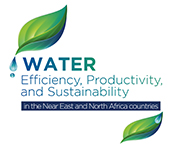Objectives

The project aims at supporting this transformational change and aims at setting the proper framework for implementing the 2030 Agenda for water efficiency and productivity (SDG 6.4) and define the safe boundaries for effective water sustainability. The project is currently being implemented in eight countries in the NENA region: Algeria, Egypt, Jordan, Iran, Lebanon, Morocco, Tunisia, and Palestine.
The project intends to set the proper framework through four major work packages:
1. Establishing a robust water accounting system providing the evidence base for the full water accounting (supply, demand, uses and recycling, present and projected) and for monitoring progress in the achievement of the targets while assessing the institutional effectiveness to govern water resources
2. Implementing a series of interventions to increase water efficiency and productivity in selected farming systems of the countries to help in achieving SDG 6.4. Interventions will include in all countries an (2a) assessment of bio-physical and economic water productivity (joint effort with the regional Technical Cooperation Programme (TCP) on water productivity). In a few countries, the project will pilot (2b) the introduction/enhancement of good practices and affordable technologies using a farmer field schools (FFS) approach with a consideration of decentralized water governance, value chain rural agro-industry, gender dimensions and incentive frameworks, adapted to each local conditions. This is to promote the uptake of good practices and technologies at the farm level and to stimulate entrepreneurial initiatives along the value chain (thus generating higher income and more job opportunities).
3. Ensuring that higher efficiency/productivity achievements for the 2030 timeline are attained within ‘safe operational boundaries of water use’ defining the conditions for ‘water sustainability’ for sustainable, socially equitable and human-rights based development. A focus is put on the assessment of trade-offs to manage the Nexus water-food-energy-climate change –environment.
4. Communication strategy and results dissemination.
Specific attention is paid to equity issues, lessening the burden for women by improving their access to technology and multiple uses of water, as well as creating opportunities for the youth.
